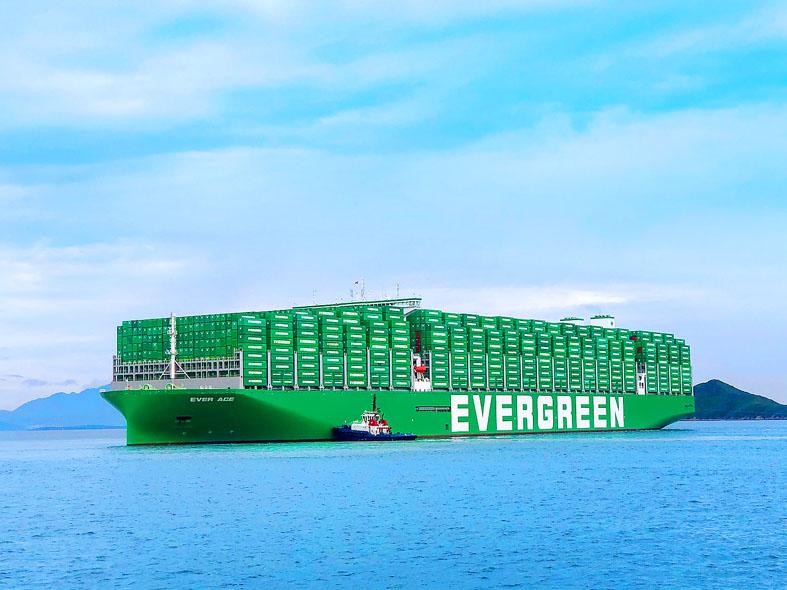Contracts between China’s top state-owned shipbuilding firm and Taiwan’s leading shipping company are likely lowering the costs of upgrading China’s navy, posing security concerns for the nation, a US think tank said on Thursday.
China State Shipbuilding Corp (CSSC, 中國船舶集團有限公司) is a key producer of vessels for the rapidly expanding Chinese People’s Liberation Army Navy, and is thought to be building its third aircraft carrier.
Taiwan’s Evergreen Marine Corp (長榮海運) has purchased 44 vessels from China since 2018, all but two of which were ordered from shipyards that produce Chinese warships, including CSSC, the Center for Strategic and International Studies said in a report.

Photo courtesy of Evergreen Marine Corp
The Washington-based think tank said foreign companies in France and other US-allied countries also buy ships from CSSC, which the US has placed on an investment blacklist for US citizens and companies due to its Chinese military links.
The center said that while there is limited transparency on the flow of foreign capital in China’s shipbuilding industry, “available evidence indicates that profits from foreign orders are likely lowering the costs of upgrading China’s navy.”
It called the foreign contracts “a tangible threat to national security” for some democracies in the region, and said companies should consider US allies South Korea and Japan as alternative shipbuilding partners.
The study included commercial satellite imagery from February showing at least three Evergreen hulls under construction near China’s newest aircraft carrier at CSSC’s subsidiary Jiangnan shipyard near Shanghai.
Evergreen vessels have also been docked next to Chinese navy cruisers and destroyers, it said.
The imagery “suggests there is direct sharing of resources between military and civilian operations at China’s key shipyards,” the center said.
Evergreen said in a statement that all of its container ship projects undergo international bidding, and that its contracts with CSSC’s commercial shipbuilding department were “completely different and separate” from CSSC’s military department.
“We believe the civil commercial ship building activities have nothing to do with national naval projects,” it said, adding that it discloses information about its orders to investors and authorities.
China already has the world’s largest navy, with a greater number of warships and submarines than the US.

TRAGEDY STRIKES TAIPEI: The suspect died after falling off a building after he threw smoke grenades into Taipei Main Station and went on a killing spree in Zhongshan A 27-year-old suspect allegedly threw smoke grenades in Taipei Main Station and then proceeded to Zhongshan MRT Station in a random killing spree that resulted in the death of the suspect and two other civilians, and seven injured, including one in critical condition, as of press time last night. The suspect, identified as a man surnamed Chang Wen (張文), allegedly began the attack at Taipei Main Station, the Taipei Fire Department said, adding that it received a report at 5:24pm that smoke grenades had been thrown in the station. One man in his 50s was rushed to hospital after a cardiac arrest

A car bomb killed a senior Russian general in southern Moscow yesterday morning, the latest high-profile army figure to be blown up in a blast that came just hours after Russian and Ukrainian delegates held separate talks in Miami on a plan to end the war. Kyiv has not commented on the incident, but Russian investigators said they were probing whether the blast was “linked” to “Ukrainian special forces.” The attack was similar to other assassinations of generals and pro-war figures that have either been claimed, or are widely believed to have been orchestrated, by Ukraine. Russian Lieutenant General Fanil Sarvarov, 56, head

SAFETY FIRST: Double the number of police were deployed at the Taipei Marathon, while other cities released plans to bolster public event safety Authorities across Taiwan have stepped up security measures ahead of Christmas and New Year events, following a knife and smoke bomb attack in Taipei on Friday that left four people dead and 11 injured. In a bid to prevent potential copycat incidents, police deployments have been expanded for large gatherings, transport hubs, and other crowded public spaces, according to official statements from police and city authorities. Taipei Mayor Chiang Wan-an (蔣萬安) said the city has “comprehensively raised security readiness” in crowded areas, increased police deployments with armed officers, and intensified patrols during weekends and nighttime hours. For large-scale events, security checkpoints and explosives

PUBLIC SAFETY: The premier said that security would be tightened in transport hubs, while President Lai commended the public for their bravery The government is to deploy more police, including rapid response units, in crowded public areas to ensure a swift response to any threats, President William Lai (賴清德) said yesterday after a knife attack killed three people and injured 11 in Taipei the previous day. Lai made the remarks following a briefing by the National Police Agency on the progress of the investigation, saying that the attack underscored the importance of cooperation in public security between the central and local governments. The attack unfolded in the early evening on Friday around Taipei Main Station’s M7 exit and later near the Taipei MRT’s Zhongshan